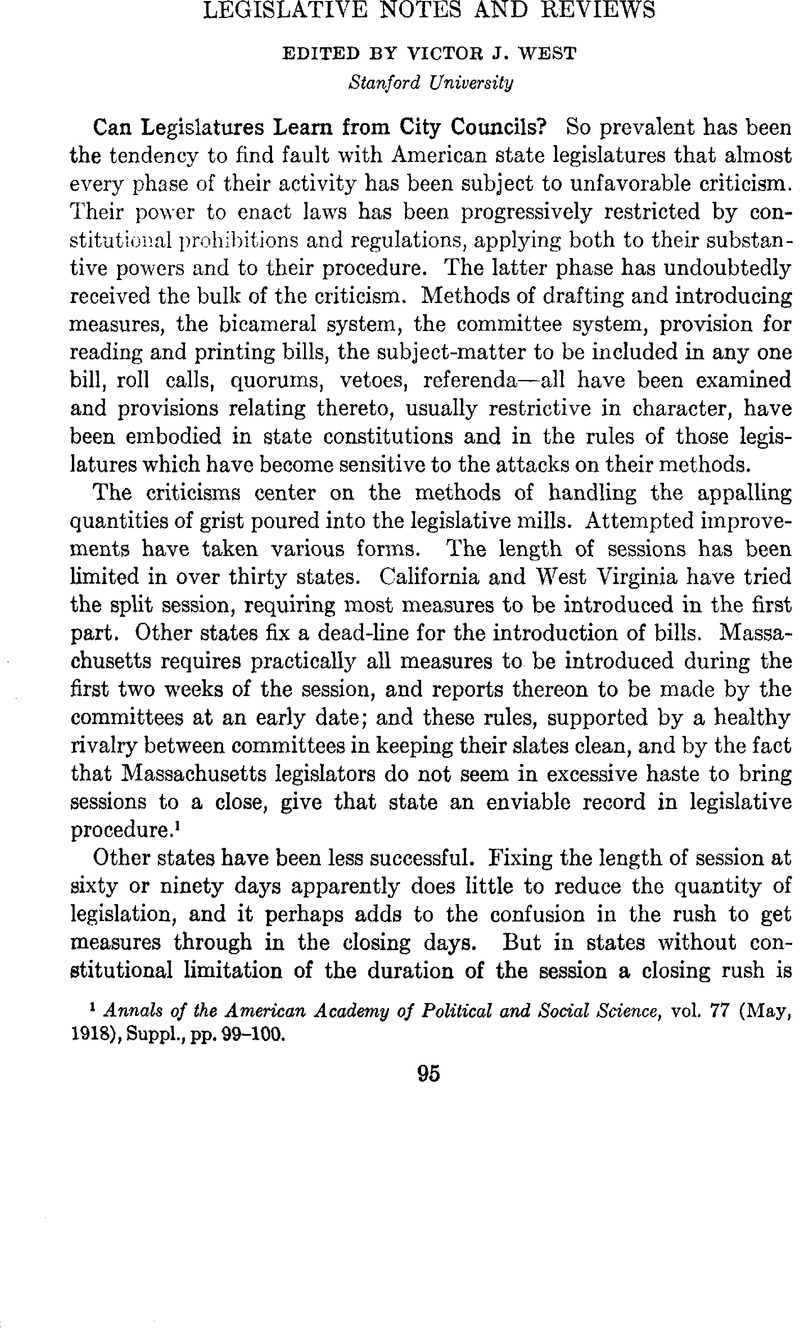No CrossRef data available.
Article contents
Can Legislatures Learn from City Councils?
Published online by Cambridge University Press: 02 September 2013
Abstract

- Type
- Legislative Notes and Reviews
- Information
- Copyright
- Copyright © American Political Science Association 1927
References
1 Annals of the American Academy of Political and Social Science, vol. 77 (May, 1918), Suppl., pp. 99–100.Google Scholar
2 “No means have been developed to remedy a condition which is partly due to a lack of effective organization throughout the session and is partly psychological.” Ibid., 98.
3 One of these was vetoed and repassed over the veto, April 17. Session Laws, Ohio, 1925, p. 445.
4 Two of these were vetoed—one to require Bible reading in the public schools, the other to empower the public utilities commission to appoint and control its employees.
5 The legislature recesses instead of adjourning in order to keep the Democratic governor from making appointments to offices the terms of whose Republican incumbents have long since expired, but who nevertheless hold until their successors have been appointed and qualified.
6 American State Government, pp. 204–7.
7 Chicago, Philadelphia, Cleveland, Baltimore, and Pittsburgh.
8 See Illinois statute of June 14, 1897, requiring publication of all ordinances providing for public improvements costing over $100,000 a week before any action is taken in the council. Also, the San Francisco charter, sec. 13, art. II, ch. 1.
9 Cleveland Plain Dealer, March 16, 1926, p. 1. The filibuster was led by Councilman Witt, who demanded that the council establish a calendar of pending legislation.
10 Especially since the passage of the city home rule law, ch. 363 of the Laws of 1924, State of New York.
11 National Municipal Review, Sept., 1925, p. 552.
12 Cleveland Plain Dealer, March 23, 1926, p. 1.
13 Letter of Councilman Hatton to the writer.
14 Section 216 of the Baltimore charter requires the city council to continue in session “for one hundred and twenty days and no longer in each year.” But its sessions may “be held continuously or otherwise” as it may by ordinance or resolution arrange.
15 Chicago, Detroit, Boston, Baltimore, Pittsburgh, Los Angeles, and perhaps others among the twelve. New York City requires two.
16 Ohio General Code, sec. 50. See also W. F. Dodd, State Government, 186–7.
17 Mathows, as cited, p. 187.
18 Sen. J. Res. 30, Session Laws, Ohio, 1923, p. 651; H. J. Res. 44, ibid., 1925, p. 544. The latter provides “that when the Eighty-sixth General Assembly adjourns on April seventeenth, nineteen hundred and twenty-five, it will be until December thirty-first, nineteen hundred and twenty-six, at one-thirty p. m., unless sooner called together by a committee composed of the lieutenant-governor and president pro tem. of the Senate, and the speaker and speaker pro tern, of the House, ….” April 17, 1925.
19 Above, p. 96.
20 An Associated Press dispatch of November 25, 1920, reports that Governor-elect W. J. Bulow of South Dakota is advocating a small unicameral legislature, to meet four times a year. Bills would be introduced and given their first and second readings at one session; they would be given their last reading and acted upon three months later.





Comments
No Comments have been published for this article.